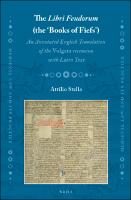The Libri Feudorum (the ‘Books of Fiefs’)
An Annotated English Translation of the Vulgata recension with Latin Text
Author(s)
Stella, Attilio
Collection
European Research Council (ERC); EU collectionLanguage
EnglishAbstract
The Libri Feudorum (the ‘books of fiefs’) are the earliest written body of feudal customs in Europe, codified in northern Italy c.1100-1250, which gave rise to feudal law as a branch of civil law. Their role in shaping modern ideas of feudalism has aroused an intense debate among medievalists, leading to deep re-thinking of the ‘feudal’ vocabulary and categories. This book offers an up-to-date English translation with a working Latin text introduced by a historical and historiographical overview of the Libri, thereby providing a valuable tool to understanding the long-standing importance of this collection over nine centuries of European history.
Keywords
civil law; comparative law; customary law; european law; feudal law; feudal revolution; feudalism; french law; ius commune; legal history; legal humanism; lombard law; roman law; susan reynoldsDOI
10.1163/9789004529175ISBN
9789004529175, 9789004504547, 9789004529175Publisher
BrillPublisher website
https://brill.com/Publication date and place
2023Grantor
Classification
History
History and Archaeology
CE period up to c 1500
Legal history


 Download
Download Web Shop
Web Shop